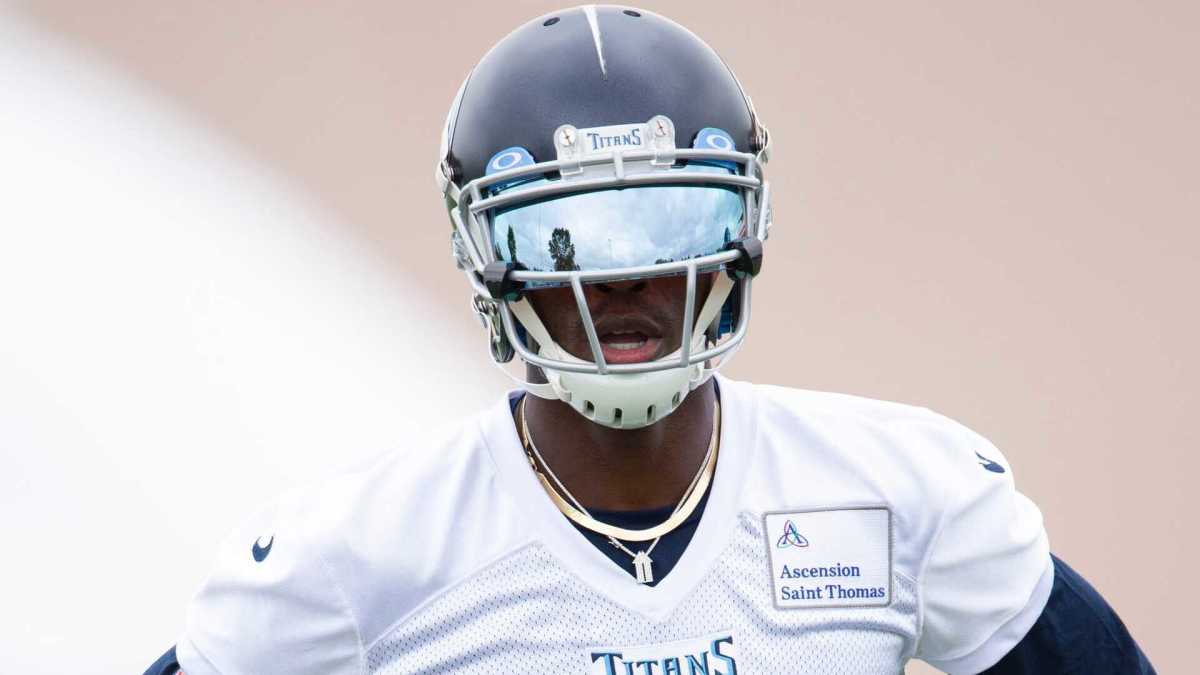The Fantasy Case Against Julio Jones: Age Chasing Down One of the All-Time Greats
The summer is here, meaning we're getting closer to the start of fantasy football drafts. Success in those drafts will come from landing terrific bargains in the middle to late rounds while avoiding players who could see their numbers decline compared to 2020. However, that latter exercise isn't easy, especially in the case of players who are among the elite at their position or are coming off breakout seasons in the stat sheets.
Case in point: In 2019, Michael Thomas emerged as the best wide receiver in fantasy with an NFL record 149 receptions, 1,725 yards, and nine touchdowns. He finished first in fantasy points at the position and became a first-round selection in 2020 fantasy drafts. Fantasy folks just trusted that because Thomas was and has been so good that he’d be just as good or better the following season. Unfortunately, those who sunk a prominent pick into the former Ohio State product ended up with a bust.
Thomas missed seven games in 2020, and his average stats per game went downhill. He caught 40 passes for 438 yards and didn't score a touchdown, and saw his points-per-game average decline from 23.4 to a mere 12. He was the biggest bust of the year.
And no one saw it coming.
That leads me to this series, aptly named “The Fantasy Case Against…” where I’ll do my due diligence in looking at players who everyone in fantasy land seems to think is a sure bet to remain uber-productive after finding a high level of success in past seasons.
This isn't me trying to sway you from picking these players; it's just something for you to think about and make your own decisions on players ahead of your fantasy drafts. The only thing predictable about the NFL and fantasy football is that it's often unpredictable (see Thomas last season), so simply do with this information what you will.
I've already broken down Justin Herbert, Alvin Kamara, Derrick Henry, Saquon Barkley, Michael Carter, and Justin Jefferson in my "The Fantasy Case Against" series. Now let's take a look at one of the best fantasy wideouts in the last 10 years, Julio Jones.
2020 Season
Jones opened the season with a monster 24.7-point performance in a loss to the Seattle Seahawks. He had a bad drop that would have been a touchdown in Dallas in Week 2 and injured his hamstring in the contest. He would miss seven of the next 14 games and was somewhat of a risk for fantasy managers even when he was active.
While he did average a very respectable 16.2 fantasy points in the nine games where he was active, he failed to score eight points three times and scored 40 percent of his points in just two games. Jones has also missed a combined eight games since 2019.
Did You Know?

Jones has scored 200-plus fantasy points eight times in his 10 NFL seasons, including seven campaigns with 250-plus points. However, he has seen his target, reception, yardage, touchdown, and fantasy point totals decline in each of the last three seasons.
Jones is also entering his 11th season in the league. Since 1970, only 26 wideouts have scored more than 200 fantasy points in their 11th NFL campaign. That's 26 players over 50 years and over 160 receivers who fit the parameters of this research.
The last wideout to produce 200-plus fantasy points in his 11th NFL season is Julian Edelman, who had 256.3 points in 2019. He's the only wideout in his 11th season to score more than 200 fantasy points since 2013 when Andre Johnson and Anquan Boldin hit the mark. A fourth wideout, Steve Smith, hit 200-plus points in 2011.
Historical Trends
There's an adage about Father Time being undefeated. That's true in real life and fantasy football. While Jones isn't old by any stretch of the imagination in real life, he enters an age when NFL players begin to see a decline in their performances. For our purposes, we will focus on wide receivers who have played a full NFL season at age 32.
During the Super Bowl era, 24 wide receivers have scored more than 200 fantasy points in their age-32 season. That’s just 24 players in 54 years. Furthermore, just four of those 24 instances have occurred in the last eight seasons, including the likes of Larry Fitzgerald (2015), Andre Johnson (2013), Wes Welker (2013), and Edelman (2018).
I've used the 200-point total as a parameter for a specific reason. In this day and age, a wideout who scores around that number of points is seen as a No. 3 receiver in fantasy. Last season, 200 points would have been good enough to finish as the WR28, just behind Cole Beasley (207.5 points) and slightly ahead of Tee Higgins (194.6 points).
At this point, Jones is being drafted as a No. 2 fantasy wideout based on ADP data. He has been an elite player in his career, of course, so fantasy managers feel safe taking him in the Round 4 range because he's almost always been a first or second-rounder.
The question is whether that should be the case.
Coaching Changes
Todd Downing is getting a second chance at being an offensive coordinator after a brief, one-year stint in Oakland (2017). That season, the Raiders threw the ball 61.1 percent of the time. That isn't going to happen for the Titans with Derrick Henry in the backfield. Last season under Arthur Smith, the Titans threw the ball 49.5 percent of the time. That was the third-fewest in the entire league. By comparison, the Falcons threw the ball 62.1 percent of the time in Jones’ last season with the team. That’s a significant gap.
Like the Titans, the Raiders also had a talented duo of wide receivers under Downing in Amari Cooper and Michael Crabtree. However, neither had more than 700 yards. I wouldn't use that against A.J. Brown and Jones, as the Titans lost over 200 targets in the offseason when Corey Davis and Jonnu Smith left the team via free agency.
Still, Jones is going from an offensive attack that threw the football a ton to one that leans far more on the ground attack with a superstar 2,000-yard rusher in its backfield.
Verdict
Aside from his impressive career resume, which has seen tough times lately, there is not a whole lot to like about Jones’ chances of returning to an elite level of production this season. Or maybe ever again. He’s already being drafted a few rounds later than normal as a result, but can he bring back WR2 value at the age of 32? It’s certainly not something that’s happened all that often over the last 50-plus years of NFL football.
Jones will also be hard-pressed to see even close to the 24 percent target share he enjoyed in his last full season (2019). While the departed Davis (92), Smith (65), and Adam Humphries (35) left behind a combined 192 targets, I can't see a scenario where Jones absorbs the vast majority of them. Brown still has room for target growth (he was 30th among wideouts last season), and receivers like Josh Reynolds, Anthony Firkser, Dez Fitzpatrick, and Racey McMath will also factor into the team's target distribution.
Fantasy managers also have to consider Jones’ lack of durability last season and the fact that he's dealt with lower-body injuries often. Maybe playing more games on grass will help improve that aspect, but drafting Jones means potentially dealing with missed time due to injuries. If you had him on your roster last season, you know exactly how frustrating he was to start at times. If you do draft Jones, be sure to factor that into your draft day decisions. And don’t be so quick to pick him based on his name value alone.
The Fantasy Case Against ...
- QUARTERBACKS
- RUNNING BACKS
- WIDE RECEIVERS
- TIGHT ENDS
MORE ARTICLES FROM MICHAEL FABIANO
Michael Fabiano is an award-winning fantasy football analyst on Sports Illustrated and a member of the Fantasy Sports Writers Association (FSWA) Hall of Fame. Click here to read all his articles here on SI Fantasy. You can follow Michael on Twitter, Facebook, YouTube, and Instagram for your late-breaking fantasy news and the best analysis in the business!
